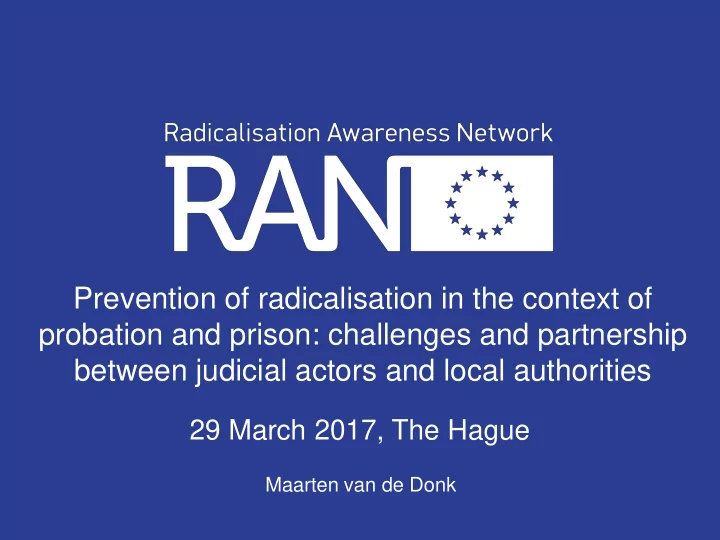

Prevention of radicalisation in the context of probation and prison: challenges and partnership between judicial actors and local authorities 29 March 2017, The Hague Maarten van de Donk
Two questions 1.What kind of programmes are developed in prison and probation for “ radicalised persons”? Are these programmes different according to the kind of extremism? Do they associate civil society and local authorities ? If yes, how? If no, why ? 2.What could be the added-value of a closer partnership between local authorities and judicial actors for the prevention of radicalisation and prevention of reoffending? And what are the challenges to overcome?
Float Chart arrest sentence release end probation society prison society processes of (de)radicalisation and (dis)engagement Interventions, programmes, support
One biography 1. Every case is unique; 2. Different mix of root causes, risk and protective factors 3. Lot of life events, significant moments; 4. Need for continuity for a. Safeguarding/ assistance b. Assessment of signs; 5. Overcoming organisational disruption during process.
Working with radicalised persons Special approaches General approaches Human prison environment
Human prison environment I • Basic requirements like no overcrowding, well organised, good food; • Trust between prisoners and prison staff; • All prisoners feeling respected; • Allowing contact with family and friends.
Human prison environments II Terrorist wings or dispersing radical prisoners? • Advantage: no contamination rest prison society, special interventions and specialised staff. • Disadvantage: limitations can make return to normal life more difficult, group pressure, ‘ terrorism highschool’.
General approaches • Using tools that are also implemented for other prisoners like: • Individual sentence plans (work, education); • Programmes for anger management/ agression therapy. • Interventions for substance abuse Families, communities, community service providers can be involved.
Specialist interventions I • Exit work (is prison a good place for that?); • Ideological support; • Dealing with PTSD; • Role of family, friends and community is key although can be problematic; • Important 3rd persons/ mentors.
Specialist interventions II • Often one on one settings provided by professionals (either government or NGO); • Dealing with specific needs of person; • Mechanisms behind different kinds of radicalisation are similar, so are solutions; • Don’t neglect the differences.
Specialist interventions III Example VPN Germany: • Both programmes extreme right and religiously inspired; • Start in prison and stop few months after release with same practitioner; • Work with families to prepare for return; • Biographical work: getting to terms with your past; • Multi-agency with community service providers.
Short sentences as a challenge • Home grown terrorism acting in own country heavier sentenced; • Short stay in prison makes building trust let alone starting a programme problematic; • Driver for further cooperation between judicial and community partners.
Acceptance as challenge I • Emprisonment never is an asset on your resume. • Radicalised persons, especially Foreign Terrorist Fighters are far from popular. • The societal climate make re-socialisation harder.
Acceptance as Challenge II Example: MAPPA UK • Multi Agency Public Protection Agreements; • Originally designed for sex offenders; • Police, Probation and Prison Services work together with other agencies to manage the risks posed; • Programme starts during emprisonment; • Both risk assessment as practical help.
Points of consideration • Who is driving the bus? • How are communities/ community leaders involved in multi-agency networks? • How to prevent people from relapse or further radicalisation at crucial points in the process of emprisonment and release?
Contact RAN CoE Veemarkt 83 NL – 1019 DB Amsterdam +31 20 463 50 50 RAN@radareurope.nl http://ec.europa.eu/dgs/home-affairs/what-we- do/networks/radicalisation_awareness_network/index_en.htm 06.12.2015 page 1
Recommend
More recommend